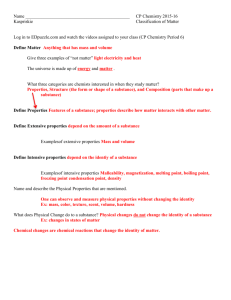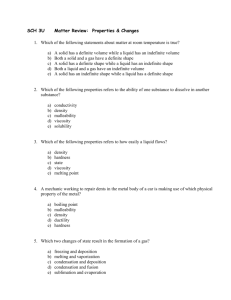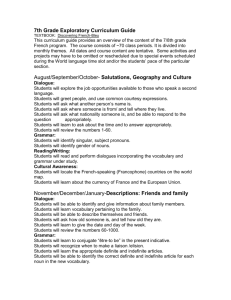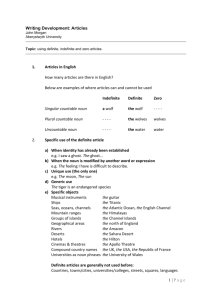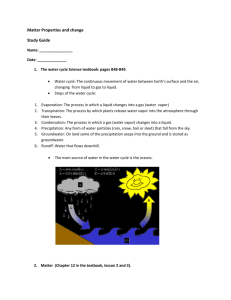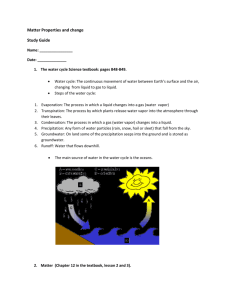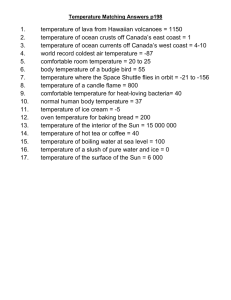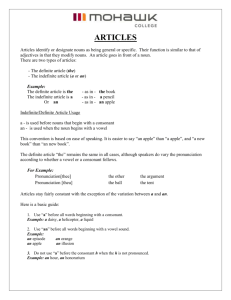Present Perfect vs. Past Simple Grammar Exercises
advertisement
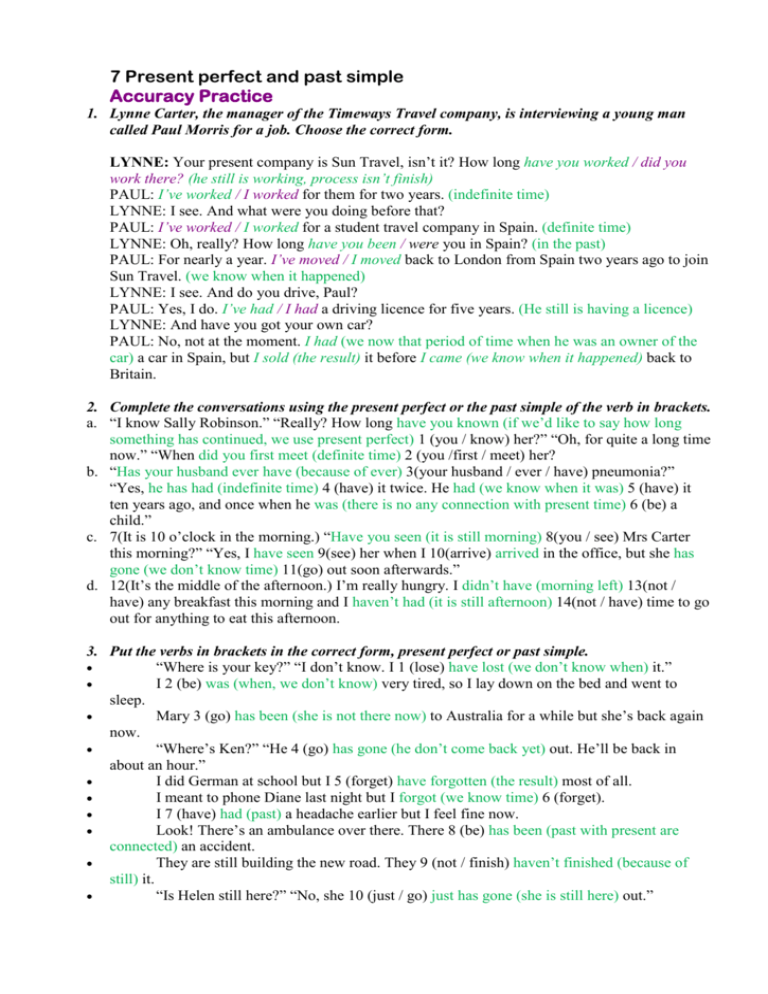
7 Present perfect and past simple Accuracy Practice 1. Lynne Carter, the manager of the Timeways Travel company, is interviewing a young man called Paul Morris for a job. Choose the correct form. LYNNE: Your present company is Sun Travel, isn’t it? How long have you worked / did you work there? (he still is working, process isn’t finish) PAUL: I’ve worked / I worked for them for two years. (indefinite time) LYNNE: I see. And what were you doing before that? PAUL: I’ve worked / I worked for a student travel company in Spain. (definite time) LYNNE: Oh, really? How long have you been / were you in Spain? (in the past) PAUL: For nearly a year. I’ve moved / I moved back to London from Spain two years ago to join Sun Travel. (we know when it happened) LYNNE: I see. And do you drive, Paul? PAUL: Yes, I do. I’ve had / I had a driving licence for five years. (He still is having a licence) LYNNE: And have you got your own car? PAUL: No, not at the moment. I had (we now that period of time when he was an owner of the car) a car in Spain, but I sold (the result) it before I came (we know when it happened) back to Britain. 2. Complete the conversations using the present perfect or the past simple of the verb in brackets. a. “I know Sally Robinson.” “Really? How long have you known (if we’d like to say how long something has continued, we use present perfect) 1 (you / know) her?” “Oh, for quite a long time now.” “When did you first meet (definite time) 2 (you /first / meet) her? b. “Has your husband ever have (because of ever) 3(your husband / ever / have) pneumonia?” “Yes, he has had (indefinite time) 4 (have) it twice. He had (we know when it was) 5 (have) it ten years ago, and once when he was (there is no any connection with present time) 6 (be) a child.” c. 7(It is 10 o’clock in the morning.) “Have you seen (it is still morning) 8(you / see) Mrs Carter this morning?” “Yes, I have seen 9(see) her when I 10(arrive) arrived in the office, but she has gone (we don’t know time) 11(go) out soon afterwards.” d. 12(It’s the middle of the afternoon.) I’m really hungry. I didn’t have (morning left) 13(not / have) any breakfast this morning and I haven’t had (it is still afternoon) 14(not / have) time to go out for anything to eat this afternoon. 3. Put the verbs in brackets in the correct form, present perfect or past simple. “Where is your key?” “I don’t know. I 1 (lose) have lost (we don’t know when) it.” I 2 (be) was (when, we don’t know) very tired, so I lay down on the bed and went to sleep. Mary 3 (go) has been (she is not there now) to Australia for a while but she’s back again now. “Where’s Ken?” “He 4 (go) has gone (he don’t come back yet) out. He’ll be back in about an hour.” I did German at school but I 5 (forget) have forgotten (the result) most of all. I meant to phone Diane last night but I forgot (we know time) 6 (forget). I 7 (have) had (past) a headache earlier but I feel fine now. Look! There’s an ambulance over there. There 8 (be) has been (past with present are connected) an accident. They are still building the new road. They 9 (not / finish) haven’t finished (because of still) it. “Is Helen still here?” “No, she 10 (just / go) just has gone (she is still here) out.” The police 11 (arrest) has arrested (connection with present) three people but later they let them go. Ann 12 (give) gave (when? We don’t know) me her address but I’m afraid I 13 (lose) lost (we don’t know when) it. Where’s my bike? It 14 (be) was (we don’t know, when) outside the house. It 15 (disappear) was disappeared (=when I saw it)! What do you think of my English? Do you think I 16 (improve) have improved (the result)? 4. Are the underlined parts of these sentences right or wrong? Correct the ones that are wrong. 1. Do you know about Sue? She’s given up her job. Right (we don’t know when) 2. The Chinese have invented printing. (we don’t exactly know when it has happened) 3. How many plays has Shakespeare written? Wrong. How many plays did Shakespeare write? 4. Have you ever read any of Shakespeare’s plays? 5. Aristotle has been a Greek philosopher. Wrong. Aristotle was a Greek philosopher. (we know when he lived) 6. Ow! I’ve cut my finger. It’s bleeding. Right 7. My grandparents have got married in London. Right 8. Where have you been born? Where did you born/have you been born? (both of the variants can be used) 9. Mary isn’t at home. She’s gone shopping. Right. Albert Einstein has been) the scientist who has developed the theory of relativity. Wrong. Albert Einstein was the scientist who has developed the theory of relativity. (we know when he lived) 5. Put the verb into the most suitable form, present perfect or past simple. 1. A: Look! Somebody has spilt (spill) coffee on the carpet. (indefinite time) B: Well, it wasn’t (not / be) me. I haven’t done (not / do) it. (indefinite time) 2. A: Ben has broken (break) his leg. (indefinite time) B: Really? How was that happen (that / happen)? (we usually use past simple to ask when something has happened) A: He has fallen (fall) off a ladder. (indefinite time) A: Your hair looks nice! Did you had (you / have) a haircut? (we usually use past simple to ask when something has happened) B: Yes. A: Who has cut (cut) it? Did you go (when you cut it) (you / go) to the hairdresser? B: No, a friend of mine did (do) it for me. 6. Are the underlined parts of these sentences right or wrong? Correct the ones that are wrong. I’ve lost my key. I can’t find it anywhere. (indefinite time) Have you seen the news on television last night? Did you see the news on television last night? (definite time) I’ve bought a new car. Do you want to see it? (indefinite time) I’ve bought a new car last week. I bought a new car last week. (definite time) Where have you been yesterday evening? Where did you be yesterday evening? (definite time) Jenny has left school in 1991. Jenny left school in 1991. (definite time) I’m looking for Mike. Have you seen him? (indefinite time) I’m very hungry. I haven’t eaten anything today. (indefinite time) Diane hasn’t been at work yesterday. Diane wasn’t at work yesterday. (definite time) When has this book been published? When did this book was published? (we usually use past simple to ask when something has happened) 7. Make sentences from the words in brackets. Use the present perfect or past simple. (it / not /rain /this week) It hasn’t rain this week. (the week is still going) (the weather / be / cold / recently) The weather has been cold recently. (indefinite time) (it / cold / last week) It was cold last week. (definite time) (I / not / read / a newspaper yesterday) I did not read a newspaper yesterday. (definite time) (I / not / read / a newspaper today) I have not read a newspaper today. (the day is not off) (Ann / earn / a lot of money / this year) Ann has earned a lot of money this year. (the year has not finished yet) (she / not / earn / so much / last year) She did not earn so much last year. (definite time) (you / have / a holiday recently?) Have you had a holiday recently? (indefinite time) 8. Put the verb into the correct form, present perfect or past simple. I don’t know where Amy is. Have you seen (you / see) her? (indefinite time) When I got (get) home last night, I was (be) very tired and I have gone (go) straight to bed. (definite time/definite time/the result) Your car looks very clean. Have you washed (you / wash) it? (indefinite time) George was not (not / be) very well last week. (definite time) Mr Clark has worked (work) in a bank for 15 years. Then he gave it up. (the result) Molly lives in Dublin. She has been living (live) there all her life. (she is still living here) “Did you go (you / go) to the cinema last night?” “Yes, but it was (be) a mistake. The film was (be) awful. My grandfather died (die) (definite time) 30 years ago. I have never met (never / meet) him. (indefinite) I don’t know Carol’s husband. I have never met (never / meet / him). 9. Write questions with how long and when. It’s raining. (how long) How long has it rained? (when) When did it start to rain? Kate is learning Italian. (how long) How long has Kate learned Italian? (when) When did Kate start to learn Italian? I know Martin. (how long) How long have you known Martin? (when) When did you know Martin? Bob and Alice are married. (how long) How long have they married? (when) When did they marry? 10. Complete the passage below, using the correct form of the verb in brackets (present perfect or simple past). The Olympic Games The original Olympic Games (1 begin) began around 8000 BC in Ancient Greece and (2 continue) have continued until they (3be) was abolished by the Roman Emperor Theodosius in AD 393. The first modern Olympics (4 take place) took place in Athens in 1896, and since then, more than a dozen different countries (5 stage) have staged the Summer Olympics. The cities of Paris, London, Berlin and Los-Angeles (6 stage) have staged the Olympics twice. In 1956, Australia (7 become) became the first country outside Europe and America to stage the Olympics, while Mexico (8 be) was the first Latin American country to stage the Olympics, in 1968. Many of greatest athletes in the world (9 take part) have taken part in the Olympic Games, but no one (10 equal) have equaled the achievements of the great Finnish athlete, Paavo Nurmi, who between 1920 and 1928 (11 win) have won nine gold and three silver medals. The Olympic Games (12 see) have seen many tragedies and triumphs. For example, in the marathon of 1908, the little Italian, Dorando Pietri (13 collapse) collapsed five times in the last part of the race, but (14 come) have come first – only to be disqualified because spectators (15 help) helped him over the finishing line. And in 1936, the famous black American athlete Jesse Owens, (16 break) broke six world records in a single day! From the first modern Olympics in Athens, when only 14 countries (17 participate) have participated, the Olympics (18 grow) have grown to include over 140 countries. Gold, silver and bronze medals (19 go) have gone to over 8,000 men and women. Starting activities Drawing time lines Work on your own. Here are time lines for sentences in the present perfect and past simple. The time lines represent the period of time the speaker is thinking about. Present perfect (the past until now) PAST NOW .________________________________________________. I have worked at Star Electronics for two years. Past simple (the past) PAST NOW .____. I studied maths and science at school. Choose which of the two time lines is correct for each sentence and draw it: We’ve lived in London for ten years. PAST NOW .________________________________________________. James left Africa in 1988. PAST NOW .____. Tracy has never been to Rome. PAST NOW .________________________________________________. Sophie has made four films in her career so far. PAST NOW .________________________________________________. Julie made four films in the 1980’s. PAST NOW .____. Test # 2 3. Use the verbs in the list to complete the sentences. Use the past simple or the present perfect. leave (*3) lose (*2) fly (* 2) have take eat (*2) 1. I have never flown from London to Dublin before. 2. We flew from London Airport to Dublin yesterday. The flight only leaved two hours. 3. 4. 5. 6. 7. 8. 3. Have you taken eaten anything yet or shall I make you a sandwich? Did you have anything at the cafe yesterday or took you only ate a coffee? You won’t believe this. Charles has left Paula! They are getting divorced. Chris left Pamela in 1990, but they are still friends. I have lost my wallet! I must have left it on the bus. I lost my wallet on holiday last year. I left it on a bus. Past simple or present perfect in context. Put in the right form of the verb in brackets. Julie, Sandra and Tom are all students together. JULIE: 1 Did you see (you / see) Tom last night? SANDRA: No, but I 2 have just come (just / come) from his house. He’s in bed. He 3 has been (be) very ill in bed for the last three days, actually. JULIE: I’m sorry to hear that. So that’s why he 4 didn’t go (not / go) to the dance last night? SANDRA: Yes. The doctor 5 has seen (see) him twice now. He’s coming again tomorrow. Oh, by the way, Tom 6 sent (send) his love to you when I 7 saw (see) him.

